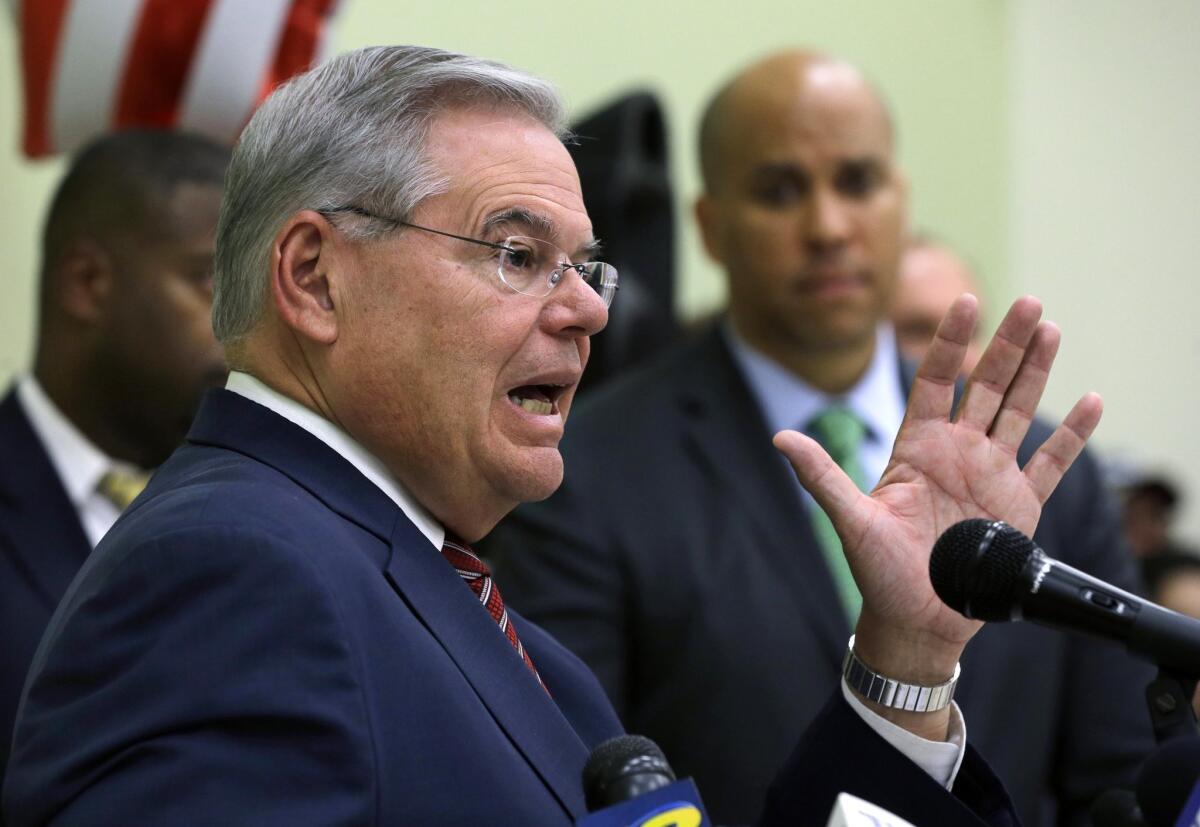These 12 senators could hold the fate of Obama’s Iran deal in their hands

Sen. Robert Menendez (D-N.J.) is a leading skeptic within his party of the Iran deal.
- Share via
Reporting from Washington — The future of a landmark nuclear deal with Iran hinges partly on the votes of about a dozen U.S. senators, mostly Democrats, who will be key players in deciding whether a resolution of disapproval advances out of Congress.
So far, opponents of the deal don’t appear to have enough support in the Senate to reach the 67-vote supermajority needed to override a presidential veto. President Obama has vowed to veto any resolution of disapproval that Congress passes.
But the big question is whether Republicans and other critics of the deal can muster the 60 votes needed to pass a resolution in the first place.
Republicans, with a 54-seat majority in the Senate and control of the House, largely oppose the deal, which would lift international sanctions against Iran in return for restrictions designed to prevent the Islamic Republic from building a nuclear bomb. They are expected to vote en masse to reject the deal when lawmakers return from summer recess next month.
That leaves a dozen or so mostly Democratic senators who could provide the six additional votes needed to avoid a filibuster and pass a resolution, if no Republicans vote in favor of the deal.
Those senators — the targets of an intense lobbying campaign by both sides — include pro-Israel hawks, foreign policy thinkers and a couple of moderate Republicans.
On Tuesday, Obama got some welcome news when three key Democrats whose votes were uncertain — Sens. Barbara Boxer of California, Tim Kaine of Virginia and Bill Nelson of Florida — all endorsed the deal.
And on Wednesday, several others, including Sen. Angus King, the independent from Maine who caucuses with the Democrats, announced their support.
Here’s a look at some senators still in play, with an assessment of who might support — or reject — the deal.
POSSIBLE OPPOSITION
Sen. Robert Menendez (D-N.J.)
Former chairman of the Senate Foreign Relations Committee and leading Democratic skeptic of the deal, Menendez has had strained relations with the White House on this and other issues. At a hearing on the deal, he questioned whether sanctions would “snap back” in the event of Iranian cheating, as the White House has claimed. He’s a safe bet to vote against the deal.
Sen. Susan Collins (R-Maine)
One of the few remaining Republican moderates, Collins is unafraid of siding with Democrats, which has led some to speculate she might support the deal. But she has voiced strong concern about the last-minute decision to lift the conventional arms embargo against Iran over a five- to eight-year period.
TOSS-UP
Sen. Richard Blumenthal (D-Conn.)
A Brooklyn-born and Ivy League-educated first-term senator, Blumenthal is better known for his legal fights against the tobacco industry than his foreign policy experience. He will be heavily lobbied on both sides as a Jewish senator with strong ties to Israel.
Sen. Joe Donnelly (D-Ind.)
He’s a red-state moderate Democrat and Catholic who has emerged as a strong, but low-key, presence since joining the Senate in 2012.
Sen. Jeff Flake (R-Ariz.)
Flake is a member of the Foreign Relations Committee and among the most conservative senators on fiscal issues. But unusual among the newer Republican senators, he’s not overtly hawkish against the deal. He holds a global view of foreign policy after having lived and worked in Africa. “We’ve got to judge it against not what’s ideal, but what’s the alternative,” he said recently.
Sen. Heidi Heitkamp (D-N.D.)
The moderate first-term Democrat from conservative North Dakota has not been shy about bucking party leadership.
Sen. Gary Peters (D-Mich.)
A new senator who has kept a lower profile, Peters represents Jewish and Arab constituents in Michigan but has not widely shared his views as he considers the issue.
Sen. Charles E. Schumer (D-N.Y.)
Schumer is the Democratic leader-in-waiting with the 2016 retirement of Senate Minority Leader Harry Reid (D-Nev.) and the highest-ranking Jewish senator. His vote will hold sway over other Democrats in Congress. “I’m not going to let pressure or politics or party influence my decision,” he said. Both sides will work hard to win his support.
POSSIBLE SUPPORT
Sen. Michael Bennet (D-Colo.)
He’s a longtime Obama ally and former state education superintendent who is running for reelection in one of the toughest races in 2016.
Sen. Ben Cardin (D-Md.)
As the top Democrat on the Foreign Relations Committee, Cardin brokered the bill giving Congress a vote on a resolution of disapproval for the Iran deal. He’s seen as a foreign policy moderate whose role as a leading Jewish senator could be helpful to the White House.
Sen. Chris Coons (D-Del.)
A lawyer and former divinity school student, Coons serves on the Foreign Relations Committee. He studied in Africa and brings a global perspective to deliberations.
Sen. Joe Manchin III (D-W.Va.)
The outspoken former governor from a conservative state often charts his own course in the Senate. But he has spoken favorably of the deal. “This agreement is an opportunity to stop Iran from acquiring a nuclear weapon,” Manchin said.
Twitter: @lisamascaro
More to Read
Get the L.A. Times Politics newsletter
Deeply reported insights into legislation, politics and policy from Sacramento, Washington and beyond. In your inbox twice per week.
You may occasionally receive promotional content from the Los Angeles Times.










